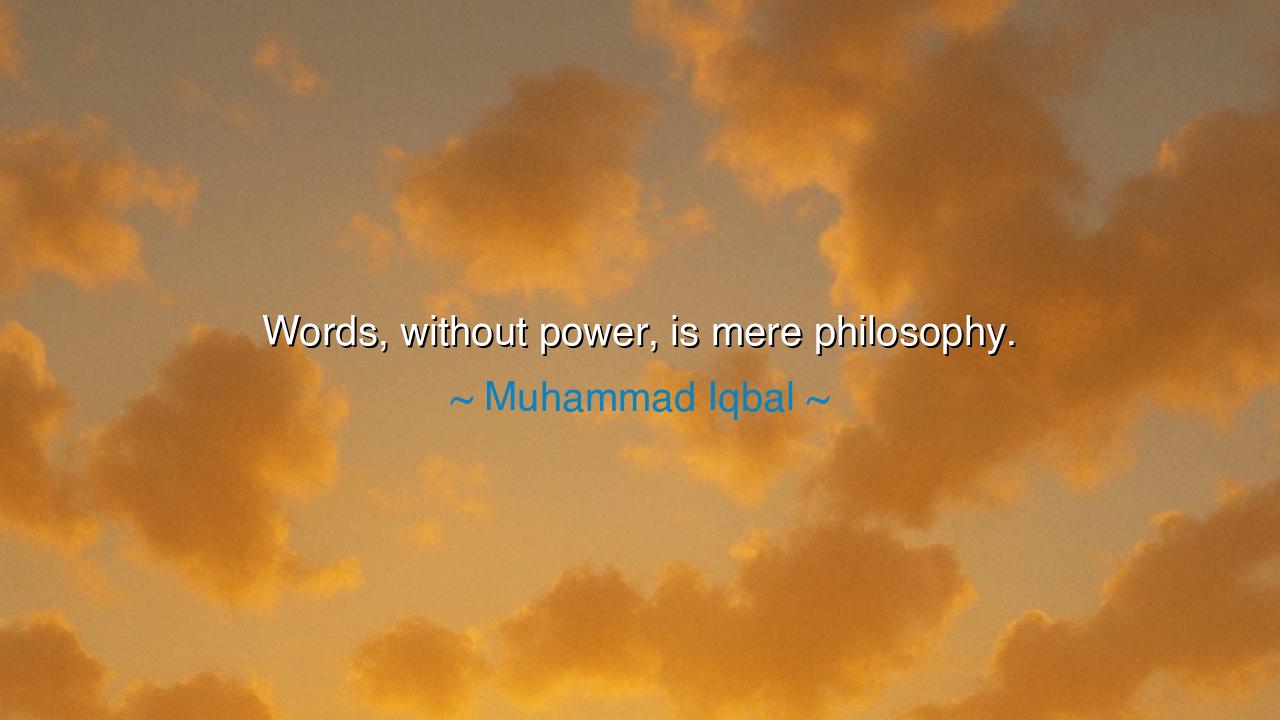
Words, without power, is mere philosophy.






“Words, without power, are mere philosophy.” These words by the great philosopher Muhammad Iqbal carry the weight of a timeless truth — that words alone, no matter how eloquent or insightful, hold little meaning unless they are accompanied by power to enact change. In the ancient world, great thinkers such as Socrates, Plato, and Aristotle knew well that philosophy was not meant to be confined to abstract thought, but to be lived and manifested in action. Words are not simply tools for contemplation; they are instruments for power, shaping lives, forging destinies, and transforming the world.
Consider the example of Alexander the Great, whose words, though few, were charged with the power to move armies and inspire nations. When Alexander spoke, he did not simply engage in intellectual discourse; his words were the catalysts for the power that led his troops across continents and changed the course of history. It was not his philosophy that made him great, but his ability to translate his vision into tangible action. His words had the power to rally, to incite, and to lead — they were not just ideas, but forces that moved the world.
Similarly, in the story of Mahatma Gandhi, his words became the foundation of a revolution that did not involve bloodshed or violence, but power through nonviolent resistance. Gandhi's speeches and writings — though filled with philosophy — were infused with the power to bring an empire to its knees. He showed the world that words, when coupled with unwavering resolve and a vision of justice, could become a weapon more powerful than any sword. His ability to inspire a nation to rise peacefully against oppression is a testament to the truth of Iqbal’s words.
Iqbal himself understood that words devoid of power are like a ship without a sail — they drift aimlessly, offering no direction or purpose. A philosophy that is not rooted in action remains a hollow shell, its wisdom untested and unfulfilled. Wisdom must be coupled with action, for it is only through the realization of thought in the real world that true power is achieved. Without this connection, ideas become mere philosophy, disconnected from the reality of human experience and incapable of effecting change.
In this light, Iqbal urges us to take our words seriously, to infuse them with meaning and intent, and to recognize that true power lies not in speaking well, but in doing well. Words must be a reflection of action — a call to make real, tangible differences in the world. Only when words are backed by the power of conviction and action do they transcend mere theory and become a force capable of reshaping lives and nations.
Thus, let us heed the wisdom of Iqbal, understanding that words must be more than just philosophical musings. They must be the clarion call for change, the spark that ignites the fire of power. To speak without the intent to act is to be lost in the wind, but to speak with the force of a vision and the determination to see it through is to wield words as the most powerful weapon of all.






PNPhuc Nguyen
This raises a concern about education and discourse. Are we too focused on theoretical knowledge without teaching students how to apply it effectively? Could emphasizing the translation of ideas into practice prevent a gap between intellect and real-world problem solving? I’d like to hear thoughts on methods to ensure that learning or philosophical understanding is accompanied by meaningful, actionable outcomes.
CChung
I feel challenged by the implication that words alone are insufficient. Sometimes I rely on writing or speaking as my main contribution, but this makes me wonder if I am overvaluing communication over tangible effort. How can ordinary individuals ensure that their philosophies or ideas actually make a difference? Are there examples where a single idea became powerful because it was paired with decisive action?
CDTran Thi Cam Dung
I find myself questioning the role of language in leadership and activism. Is it possible for powerful words to inspire transformation even if the speaker lacks authority or practical means to enforce change? Conversely, can someone with power but no persuasive articulation succeed in bringing about true progress? I’d love perspectives on the balance between intellectual insight and practical implementation in shaping society.
NNTuan ._. Nguyen Nguyen
This makes me reflect on the distinction between theory and action. Can ideas or speeches truly have value if they don’t lead to meaningful change? I wonder how often society mistakes eloquence for impact, applauding those who speak well while ignoring whether their words translate into real-world influence. How can one cultivate the ability to turn thought into action effectively, without falling into empty rhetoric?